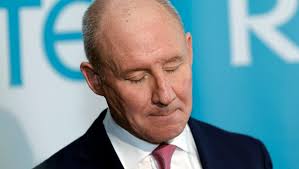
Jim Gavin Exits Irish Presidential Race 'With Immediate Effect' Following Controversy
Fianna Fáil presidential candidate Jim Gavin has dramatically withdrawn from the Irish presidential election, announcing his decision "with immediate effect" on Sunday evening, October 5, 2025. The former Dublin GAA manager's unexpected exit has transformed the upcoming election into a two-woman contest and left serious questions about Fianna Fáil's campaign strategy.
The Withdrawal Statement
In a carefully worded statement released through Fianna Fáil, Gavin acknowledged that recent developments had prompted serious reflection about his candidacy. The 54-year-old Dubliner admitted to making "a mistake that was not in keeping with my character and the standards I set myself," though he did not elaborate on the specific nature of the error.
"I am now taking steps to address the matter," Gavin stated, adding that he had also considered "the potential impact of the ongoing campaign on the wellbeing of my family and friends." His decision to withdraw came just hours after he failed to adequately address questions about a financial dispute involving a former tenant.
The Financial Controversy
The controversy centers on a rental property dispute dating back sixteen years. According to reports, a tenant who rented an apartment owned by Gavin in Dublin's north inner city between 2007 and 2009 continued paying rent through a banking error even after moving out. The former tenant claimed that €3,300 was paid in error and that despite multiple attempts to contact Gavin for a refund, the money was never returned.
When initially questioned about the matter, Gavin told reporters he was "looking into it" but acknowledged he did not have "all the information" about the situation. He also revealed that his own family had been experiencing financial difficulties at the time, and he subsequently lost the property. Crucially, he admitted that the tenancy had not been officially registered with the relevant authorities.
Campaign Challenges and Polling
Gavin's withdrawal came against the backdrop of mounting campaign challenges. Beyond the rental dispute, his campaign faced scrutiny over promotional videos featuring drone footage that allegedly violated aviation regulations, adding to the growing list of controversies surrounding his candidacy.
A recent Sunday Independent/Ireland Thinks poll had placed Gavin in last place with just 15% support, trailing Independent candidate Catherine Connolly at 32% and Fine Gael's Heather Humphreys at 23%. These numbers suggested an uphill battle for the Fianna Fáil candidate even before the latest revelations emerged.
Political Implications for Fianna Fáil
The withdrawal represents a significant blow to Fianna Fáil's presidential election strategy and raises uncomfortable questions about party leader Micheál Martin's judgment. Martin had been the driving force behind Gavin's candidacy, overcoming internal party resistance to secure his nomination in September.
In response to the withdrawal, Martin acknowledged that Gavin had "accepted that he made an error" and supported his decision as "the correct one." However, the Taoiseach now faces criticism from within his own party about the vetting process and his personal advocacy for a candidate who ultimately proved unsuitable for Ireland's highest office.
"Jim has achieved an enormous amount in his life," Martin stated. "His commitment to service and helping others has always, quite rightly, defined his character and his great standing with the public." Despite this supportive statement, political observers suggest Martin will face significant internal party scrutiny over the failed candidacy.
The Remaining Candidates
With Gavin's exit, the presidential election scheduled for October 24, 2025, becomes a straight contest between two women. Independent TD Catherine Connolly, who enjoys broad support from left-wing parties, now leads in polling and appears well-positioned to capitalize on the absence of a major party rival.
Fine Gael's Heather Humphreys, a senior cabinet minister, represents the government party's hopes of retaining the presidency. The dynamic between these two experienced politicians will now define the remainder of the campaign, with both likely to benefit from increased media attention in the absence of a third major candidate.
Gavin's Background and Rise
Jim Gavin's political journey began just months ago when Fianna Fáil members approached him about seeking the presidency. The former Dublin football manager, best known for leading the county to five successive All-Ireland Championships, was not a career politician but had built a reputation as a disciplined leader and public servant.
His background includes service as a senior civil servant and retired Irish Defence Forces officer, credentials that initially made him an attractive candidate for Fianna Fáil. During the internal party selection process, he defeated MEP Billy Kelleher by 41 votes to 29, demonstrating significant support among party parliamentarians.
Campaign Reflection and Service Record
In his withdrawal statement, Gavin reflected on his motivation for entering the race, emphasizing his "spirit of lifelong public service and love of country." He described the presidency as "the highest office in the land and the pinnacle of public service" that "must be untainted by controversy or distraction."
"I believe deeply in this country, its dreams, its hopes and above all its people," Gavin stated, acknowledging that while he had "never shirked from a contest," the current circumstances made continuation impossible. He thanked supporters who had encouraged his candidacy and expressed hope they would "understand my decision and not feel let down."
Looking Forward
The dramatic reshaping of the presidential race just weeks before polling day creates uncertainty about the final outcome. Gavin's name will remain on ballot papers due to the timing of his withdrawal, potentially causing confusion among voters.
For Fianna Fáil, the failed candidacy represents more than just electoral disappointment – it raises fundamental questions about the party's decision-making processes and leader's political instincts. As the only major party without a candidate in the race, Fianna Fáil must now navigate the embarrassing aftermath of their candidate's dramatic exit.
The focus now shifts to Connolly and Humphreys, who will contest what has become an unprecedented all-female presidential race in Irish political history.
